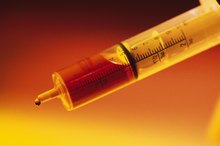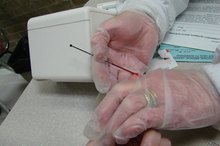What Are the Causes of High Cholesterol and Liver Enzymes?
Your liver, one of the largest organs in your body, stores energy and nutrients, makes proteins and enzymes, breaks down and removes harmful substances and produces cholesterol. Doctors monitor liver function by determining the level of three important liver enzymes: gamma–glutamyltransferase, or GGT, aspartate aminotransferase, or AST, and alanine aminotransferase, or ALT. Several medical conditions that can cause high cholesterol can also cause high liver enzymes.
If you are experiencing serious medical symptoms, seek emergency treatment immediately.
Hypothyroidism
The thyroid gland located in your neck produces two main thyroid hormones: triiodothyronine, or T3, and thyroxine, or T4, which regulate the function of most of your tissues and organs. These thyroid hormones stimulate the production of sterol regulatory element-binding protein in the liver. This protein activates receptors found on liver cells that bind to cholesterol and use it to produce bile acids. Hypothyroidism is a medical condition in which your thyroid fails to produce enough thyroid hormones. A low level of thyroid hormone causes a reduction in sterol regulatory element-binding protein and inhibits the binding of cholesterol. This allows more cholesterol to remain in the blood, causing high cholesterol levels. Hypothyroidism also causes an increase in liver enzymes.
- The thyroid gland located in your neck produces two main thyroid hormones: triiodothyronine, or T3, and thyroxine, or T4, which regulate the function of most of your tissues and organs.
- These thyroid hormones stimulate the production of sterol regulatory element-binding protein in the liver.
Obesity
What Does High Enzymes Mean?
Learn More
The World Health Organization states that as of 2010, more than 65 percent of adult females and more than 80 percent of adult males in the United States are either overweight or obese 3. Obesity, defined as excess body fat with a body mass index of 30 or greater, is an epidemic that contributes to heart disease, stroke, diabetes and cancer. Added body fat increases your cholesterol level. MayoClinic.com notes that losing even 5 to 10 lbs. can reduce your cholesterol levels. Excess body fat also affects your liver function and causes liver enzymes to increase.
- The World Health Organization states that as of 2010, more than 65 percent of adult females and more than 80 percent of adult males in the United States are either overweight or obese 3.
- Excess body fat also affects your liver function and causes liver enzymes to increase.
Alcohol
Drinking alcohol in moderation may help protect against heart disease by increasing HDL, or "good," cholesterol levels. Excessive alcohol intake, defined as more than one drink per day for women and more than two drinks per day for men, can cause serious health conditions like high blood pressure and heart disease. When making lifestyle changes to lower your cholesterol, doctors recommend reducing your alcohol intake. In addition, because your body views alcohol as a toxic substance, your liver must break it down, making the liver vulnerable to adverse effects. Excessive alcohol intake can lead to alcoholic liver disease, which doctors can diagnose by noting increased levels of AST and GGT 1.
- Drinking alcohol in moderation may help protect against heart disease by increasing HDL, or "good," cholesterol levels.
- Excessive alcohol intake can lead to alcoholic liver disease, which doctors can diagnose by noting increased levels of AST and GGT 1.
Prescription Medications
What Does a High SGOT in a Liver Function Test Mean?
Learn More
Many prescription medications affect liver function because the liver must break down the medication. Sometimes treating one condition, like high blood cholesterol, can make the liver enzymes increase even more. If you cannot lower your cholesterol levels enough through lifestyle changes alone, your doctor may prescribe a statin medication. Statin medications inhibit the activity of the enzyme 3-hydroxy-3-methylglutaryl coenzyme A reductase, or HMG-CoA reductase, which slows down the production of cholesterol. Statin medications can cause serious side effects like liver damage and rhabdomyolosis – the breakdown of muscle tissue -- so your doctor will closely monitor your liver enzymes to ensure they do no rise too high.
- Many prescription medications affect liver function because the liver must break down the medication.
- Statin medications can cause serious side effects like liver damage and rhabdomyolosis – the breakdown of muscle tissue -- so your doctor will closely monitor your liver enzymes to ensure they do no rise too high.
Related Articles
References
- National Institute of Alcohol Abuse and Alcoholism: Alcoholic Liver Disease; January 2005
- “World Journal of Gastroenterology”; Thyroid Hormones and Thyroid Hormone Receptors – Effects of Thyromimetrics on Reverse Cholesterol Transport; M. Pedrelli; December 2010
- Cleveland Clinic. Cirrhosis of the Liver. Reviewed January 11, 2019.
- David S, Hamilton JP. Drug-induced Liver Injury. US Gastroenterol Hepatol Rev. 2010;6:73–80.
- American Liver Foundation. Medications.
- Cleveland Clinic Health Essentials. Is Acetaminophen Safe to Take When You're Drinking? Published December 19, 2017.
- University of Michigan, Michigan Medicine. Methyldopa. Revised September 17, 2018.
- Elsevier Science Direct. Hypervitaminosis A. Published 2015.
- National Center for Biotechnology Information, U.S. National Library of Medicine. LiverTox: Clinical and Research Information on Drug-Induced Liver Injury: Vitamin A. Updated December 3, 2013.
- National Center for Biotechnology Information, U.S. National Library of Medicine. LiverTox: Clinical and Research Information on Drug-Induced Liver Injury: Niacin. Updated February 2, 2014.
- Amathieu R, Levesque E, Merle JC, et al. Insuffisances hépatiques aiguës sévères d'origine toxique : prise en charge étiologique et symptomatique [Severe toxic acute liver failure: etiology and treatment]. Ann Fr Anesth Reanim. 2013;32(6):416–421. doi:10.1016/j.annfar.2013.03.004
- Devarbhavi H. An Update on Drug-induced Liver Injury. J Clin Exp Hepatol. 2012;2(3):247–259. doi:10.1016/j.jceh.2012.05.002
- Johns Hopkins Medicine. Drug-Induced Hepatitis.
Resources
Writer Bio
Stephanie Chandler is a freelance writer whose master's degree in biomedical science and over 15 years experience in the scientific and pharmaceutical professions provide her with the knowledge to contribute to health topics. Chandler has been writing for corporations and small businesses since 1991. In addition to writing scientific papers and procedures, her articles are published on Overstock.com and other websites.









